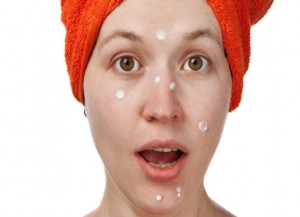Vegan Acne
Q I read a past question regarding skin problems following adoption of a vegan diet. The response was that hormones in soy may be the culprit. I, too, have experienced worsening, oily, blemish-prone skin only since adoption of a vegan diet about three months ago. I’m wondering if you have any other advice as I have a really limited intake of soy (no soy milk, tofu once a week, very limited consumption of other soy-based foods). My skin used to be very well balanced and clear. Please help!
A Acne and skin break outs are not uncommon for those becoming vegan. I know it seems like a cop out response, but you may be detoxing. I read a lot of chat rooms looking for similar symptoms and some easy fixes to suggest as well as a little science about the skin. Many new vegans appear to break out, and I have personally seen this, for a few months and/or up to a year, and then their systems balance out. Blemishes are an infection and your body’s attempt to get rid undesirable material. You may need to pump up your immune system to help your body eliminate what it is attacking.
Also, I have been thinking about my own skin challenge. I had been vegetarian for 8 years when I ended up with cysts on my face. It was very painful. I was living on the road and didn’t have the same diet or stress factors. Later I developed a constant cold and no energy. Previously, I had been running 3-5 miles 5 times a week with a short core workout. However, what I eventually did to help my skin may, at least, help you boost your immune system.
First, I would check your diet. Are you getting enough oil? I do not mean olive oil sitting in a jar. Are you eating walnuts and flax? These are great sources of Omega-3 fatty acids. Fats deal with skin issues. Are you getting too much Omega-6 fatty acids. You would be eating those from processed foods and greasy foods. I would sprinkle 2 tablespoons of flax meal [not oil or seeds] on your food daily. You may want to try an Omega-3 supplement derived from micro algae. There are vegan pills forms as well as drops.
Think about getting an allergy test from you healthcare provider. I developed an allergy to glycerin, yeast and mold in my 30’s. I know not from whence it came, but I did get rid of it through my diet.
My doctor put me on the elimination diet, which almost eliminated my diet, but it worked. This diet cut out all sugars, fermented foods and yeasts of any type. This excluded tempeh, tofu, seitan, vinegar, all sweeteners, bread and all alcohol. I ate a ton of fresh veggies, very little fruit [no dried fruit at all], grains and legumes. Any nuts had to be cooked to ensure any mold would be killed. I had nuts that tasted great, but I could tell if they had mold by my reaction. Any type of seeds was acceptable. I followed this for 6 months. Within a month, another patient in my doctor’s waiting room looked at me and asked how I had such beautiful skin. I almost cried.
I would suggest you do the same type of simple food regime. Forget oils and make walnuts, flax meal and avocados your choice of oil sources. A few walnuts a day, and a couple of tablespoons of flax meal should do the trick.
Make sure you are drinking enough water. Hydration is so important to good skin.
There are a million ways to make veggies, grains and legumes. You can change up the spices to create variety. Pasta Fiagioli with quinoa pasta has lots of protein. Simmer Indian spices such as curry, garam masala, cumin and coriander with some tomato sauce and chick peas and pour it over your steamed eggplant, carrots, peppers, broccoli and basmati rice. Stuff a couple of bell peppers with kamut, onion, mushroom and corn. Top it with the Walnut Grapefruit sauce from my website, http:// www.ladivadietitian.com.
Make sure you are eating your greens. Dermatologist, Susan C. Taylor, MD, 1 emphasizes whole grains and calcium for good skin. Collard greens and bok choy have more absorbable calcium than any dairy product as well as having healthy fats. She also mentions biotin, a B vitamin, found in fruits and green vegetables such as swiss chard and cabbage.
Don’t stress out. I mentioned detoxing as being a cop out answer spewed by every healthcare website. Another cop out is stress. On the other hand, your skin is a very emotional organ. If you have been eating extremely well, but are now slipping into a few old habits your body can have some major reactions. You may have become much more sensitive to foods. Maybe your job is the same, but since becoming vegan are your social encounters the same’ Any anxieties with family members’
Lastly, you can try taking Zinc picolinate. It is common practice to have patients with wounds to take a zinc supplement. Also, some studies have shown that vegans can have a deficit of zinc. It appears that the picolinate is more absorbable and may produce a better outcome. You are experiencing the body trying to heal itself so a little help is a good thing. If you do take the zinc do not take it on an empty stomach. Zinc by itself can cause nausea. Barley, bulgur wheat, lentils and chick peas are good sources for zinc if you want to eat your way to health.
I don’t rely on personal testimony to rule my opinion, but I have to say I was surprised at the number of vegans who had skin issues in the beginning of their journey had no issues six months down the road. May be there is something to the saying ‘Time heals everything.’


